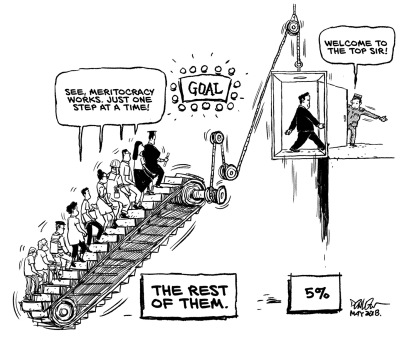Needsocracy: A Paradigm Shift from Merit to Need
Needsocracy: A Paradigm Shift from Merit to Need
In an age of ostensible progress and societal evolution, we frequently find ourselves questioning systems that were once held as paragons of fairness. One such system, the meritocracy, is increasingly under scrutiny. Heralded as the gold standard of societal organization, where power and resources are awarded based on individual talent and achievement, meritocracy is now facing a formidable challenger: Needsocracy.
In a rapidly changing world where the definitions of success and progress are constantly evolving, a new concept is slowly emerging from the shadows: Needsocracy. At its core, it challenges our traditional meritocratic systems by positing that positions of power, responsibility, and resources be earned based on needs rather than merit. But what does this really mean, and how might it change the world as we know it?
Understanding Meritocracy
To grasp the implications of Needsocracy, it’s essential to understand its antecedent – Meritocracy. Rooted in the belief that power and resources should be awarded to individuals based on talent, effort, and achievement, Meritocracy has long been hailed as the fairest system of distribution. By prioritizing competence and hard work, it promises a level playing field where everyone has an equal opportunity to rise to the top based on their merit.
The Shortcomings of Meritocracy
While meritocracy has its strengths, it isn’t without its criticisms. Critics argue that:
- A Pretense of Equality: Meritocracy peddles the illusion of a level playing field, where success is solely a result of hard work and talent. But, in reality, initial conditions, family background, and sheer luck often play a larger role in individual success than merit.
- Perpetuating Privilege: Far from being the ultimate fair system, meritocracy often serves to perpetuate privilege. The well-connected get better opportunities, the rich have access to better education, and thus the cycle continues.
- The Relentless Grind: Meritocracy promotes an unhealthy obsession with perpetual achievement. It glorifies overwork, leading to burnout, mental health challenges, and a society where the worth of an individual is reduced to their output.
- Overemphasis on Competition: This often leads to societal stress, mental health challenges, and at times, a ruthless pursuit of success at the expense of ethics and interpersonal relationships.
- Ignoring the System: Meriticracy, grounded as it is in the merits of the individual, ignores “Deming’s 95:5” – the fact that some 95% of an individual’s contributions are dictated by the system (the way the work works) and only some 5% by the merits of the individual.
Enter Needsocracy
Needsocracy flips the script by arguing that societal roles and resources should be distributed based on the needs of individuals and communities. Here’s what that might look like:
- Prioritising Humanity: Instead of an endless race to the top, Needsocracy encourages society to cater to the basic human needs of its members, promoting overall well-being.
- True Representation: Under Needsocracy, leadership and responsibility would be entrusted to those who genuinely understand and represent societal needs. No longer would decisions be made by those detached from ground realities.
- Resource Allocation: Resources would be allocated to those who need them the most, whether it’s in the form of financial assistance, access to education, or healthcare. The goal is to create a foundation from which everyone can achieve their potential.
- Power & Responsibility: In a Needsocratic system, positions of power will be occupied by those who represent the most pressing needs of society. For instance, if a community faces a severe water crisis, leadership positions will be occupied by individuals directly affected by this challenge, ensuring that those with firsthand experience are making the decisions.
- Collaborative Over Competitive: By focusing on needs, society will transition from a competitive model to a more collaborative one. The success of one individual would be seen in the context of the well-being of the community.
Benefits of Needsocracy
- Inclusive Growth: Needsocracy has the potential to level the playing field and ensure that marginalized communities get a fair share of resources and representation.
- Holistic Development: By focusing on needs, we can address systemic challenges and root causes, leading to more sustainable solutions.
Challenges Ahead
The shift from Meritocracy to Needsocracy won’t be easy. Defining ‘need’ objectively, ensuring transparency, and avoiding misuse are just a few challenges. Moreover, balancing individual aspirations with societal needs will be a complex task. Societies already grounded in catering to cummunal needs – like the Chinese – may find the transition easier.
Summary
Let’s question long-held beliefs and systems. Meritocracy, once believed to be the epitome of fairness, now stands exposed with its flaws. Needsocracy offers a compelling alternative, urging us to consider a society that genuinely serves its people rather than creating hollow hierarchies.
Needsocracy offers a fresh perspective on how we might structure societies – and businesses, societies in microcosm – for the betterment of all. While it’s still an emerging concept, its potential to usher in a more inclusive, equitable, and holistic era of development is undeniable. As with all societal shifts, the journey to Needsocracy will require debate, experimentation, and evolution. But as we look to the future, perhaps it’s time to reject merit as the determinant of our worth and place in society.

